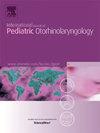Changes of autophagy related proteins during sublingual immunotherapy treatment in allergic rhinitis
IF 1.3
4区 医学
Q3 OTORHINOLARYNGOLOGY
International journal of pediatric otorhinolaryngology
Pub Date : 2025-07-06
DOI:10.1016/j.ijporl.2025.112477
引用次数: 0
Abstract
Background
Allergic rhinitis (AR) affects the nasal mucosa, causing significant quality of life impairments. Sublingual immunotherapy (SLIT) is effective in mitigating AR symptoms. Autophagy regulates immune responses and is implicated in AR. We aimed to investigate the impact of SLIT on autophagy-associated proteins and their relationship with Th1 and Th2 cytokines in AR patients.
Methods
Sixty AR children were recruited. They underwent standardized SLIT with Der f extract. Efficacy was evaluated using combined symptom and medication score (CSMS). Blood samples were analyzed for autophagy-related proteins (ATG5, p62, Beclin-1, LC3I, LC3II) and Th1/Th2 cytokines (IFN-γ, IL-4).
Results
After 3 years’ SLIT, ATG5, LC3I, LC3II, and Beclin-1 expressions decreased, while p62 increased. Th1 cytokine expression increased, and Th2 cytokine expression decreased. The effective group showed greater changes in protein expression compared to the ineffective group. A positive correlation was found between autophagy-associated protein expression and Th2 cytokines.
Conclusion
SLIT alters autophagy-related protein levels and reverses the Th1/Th2 balance in AR patients, suggesting autophagy-associated proteins as potential biomarkers for SLIT efficacy.
舌下免疫治疗变应性鼻炎过程中自噬相关蛋白的变化
变应性鼻炎(AR)影响鼻黏膜,造成显著的生活质量损害。舌下免疫治疗(SLIT)对缓解AR症状有效。自噬调节免疫反应,并与AR有关。我们旨在研究SLIT对AR患者自噬相关蛋白的影响及其与Th1和Th2细胞因子的关系。方法招募60例AR患儿。他们接受了标准的用Der f提取物进行的SLIT。采用症状与药物联合评分(CSMS)评价疗效。分析血样中自噬相关蛋白(ATG5、p62、Beclin-1、LC3I、LC3II)和Th1/Th2细胞因子(IFN-γ、IL-4)。结果SLIT治疗3年后,ATG5、LC3I、LC3II、Beclin-1表达降低,p62表达升高。Th1细胞因子表达升高,Th2细胞因子表达降低。有效组蛋白表达变化明显大于无效组。自噬相关蛋白的表达与Th2细胞因子呈正相关。结论SLIT可改变AR患者自噬相关蛋白水平,逆转Th1/Th2平衡,提示自噬相关蛋白可作为SLIT疗效的潜在生物标志物。
本文章由计算机程序翻译,如有差异,请以英文原文为准。
求助全文
约1分钟内获得全文
求助全文
来源期刊
CiteScore
3.20
自引率
6.70%
发文量
276
审稿时长
62 days
期刊介绍:
The purpose of the International Journal of Pediatric Otorhinolaryngology is to concentrate and disseminate information concerning prevention, cure and care of otorhinolaryngological disorders in infants and children due to developmental, degenerative, infectious, neoplastic, traumatic, social, psychiatric and economic causes. The Journal provides a medium for clinical and basic contributions in all of the areas of pediatric otorhinolaryngology. This includes medical and surgical otology, bronchoesophagology, laryngology, rhinology, diseases of the head and neck, and disorders of communication, including voice, speech and language disorders.

 求助内容:
求助内容: 应助结果提醒方式:
应助结果提醒方式:


